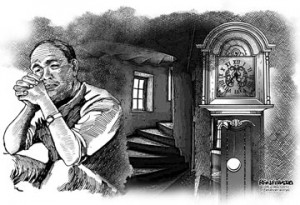About time

Sleeping was an ordeal. Every time I dropped off, the clock would sound and wake me up – and it would be like this every fifteen minutes, culminating on the hour, with additional strokes indicating the time, and which at midnight numbered twelve deep deafening dongs. Thereafter, I would just stare in the dark, fully awake, listening to the ticking of the clock, which I would hear again during the day, when I was assigned to clean the stairs.
Looking back, I tell myself that I could just have spent the rest of the night reflecting on the nature of time, except that we had to get up before sunrise for meditation and the Holy Mass.
In Mark, Jesus reminded the apostles, “Whoever wishes to be great among you will be your servant; whoever wishes to be first among you will be the slave of all.” (Jesus emphasized this because the apostles were indignant over what James and John had asked him, that in his glory they may sit one at his right and the other at his left.)
By chance I find echoes of this in a passage from Abandonment to Divine Providence by Jean-Pierre de Caussade. He wrote: “The mind, together with everything that depends on it, is bent upon holding first place among the means of divine action, and it has to be reduced to the last place like a dangerous slave.”
The French Jesuit was discussing how a person could have vast knowledge of the spiritual life, and yet, if his knowledge remains merely theoretical, “compared with those who attain the goal of God’s design without knowing the theory of it…,” he is like a sick doctor in contrast to the simple people who are in perfect health.
Article continues after this advertisementHe added that just as it is fire and not the philosophy or scientific knowledge of fire that warms us, so it is the will of God that sanctifies us, not intellectual speculation about God’s designs and their effects.
Article continues after this advertisementOn the days when I cleaned the main stairs of the monastery – especially the area around the grandfather clock – likely as not, the swinging of the pendulum would set me into standing before it and chewing the cud, ruminating – on time. I might muse on Plato, who described time as “the moving image of eternity,” and Aristotle, who considered time as the counting of movement with respect to the before and after. And, of course, Augustine, who wrote: “What then is time? If no one asks me, I know what it is. If I wish to explain it to him who asks me, I do not know.” As good a comment as the answer Louis Armstrong gave to the question, what is jazz? “If you gotta ask, you’ll never know.”
But then I would miss the point, fail to see the reason why I was cleaning the stairs. To Jean-Pierre de Caussade it should be enough for those who lead a spiritual life “to see that each moment brought with it a duty to be faithfully fulfilled,” and to fix their attention on “each successive moment, like the hand of a clock which marks each moment of the hour.” With divine guidance they can easily turn to each new duty as it is presented to them by God each hour of the day.
Everything is reduced, said de Caussade, to the complete and utter self-abandonment of the soul to God’s will under whatever form it is manifested.
Obviously, God put me near the stairs beside the grandfather clock, not to reflect on time, but to sweep the floor – for love of God. That was how I was to attain perfection. For, said de Caussade, “The fulfillment of grace is the perfection of the heart and not of the mind.”